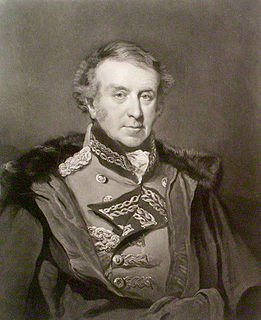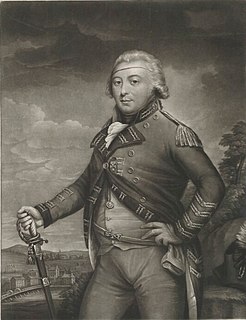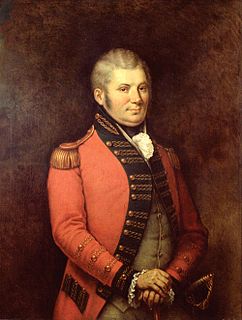 W
WGeneral Sir Andrew Francis Barnard was an Irish British Army officer. He served in various capacities in the West Indies, the Cape of Good Hope, Canada, the Netherlands, Sicily, Spain and in the Napoleonic Wars including the Battle of Waterloo for which service he was highly decorated. After his retirement from active duty, he served in a number of civilian positions, being promoted to general four years before his death.
 W
WGeneral Sir Hew Whitefoord Dalrymple, 1st Baronet was a Scottish general in the British Army and Governor of Gibraltar.
 W
WMajor-General Sir Henry Johnson, 1st Baronet, was an Anglo-Irish general in the British Army.
 W
WLieutenant-General Albemarle Bertie, 9th Earl of Lindsey was a British nobleman and general.
 W
WMajor-General Sir Evan John Murray-Macgregor of Macgregor, 2nd Baronet, was a Scottish colonial administrator and senior British army officer.
 W
WJohn Graves Simcoe was a British Army general and the first lieutenant governor of Upper Canada from 1791 until 1796 in southern Ontario and the watersheds of Georgian Bay and Lake Superior. He founded York and was instrumental in introducing institutions such as courts of law, trial by jury, English common law, and freehold land tenure, and also in the abolition of slavery in Canada.
 W
WSir Thomas Francis Wade, was a British diplomat and sinologist who produced an early Chinese textbook in English, in 1867, that was later amended, extended and converted into the Wade-Giles romanization system for Mandarin Chinese by Herbert Giles in 1892. He was the first professor of Chinese at Cambridge University.
 W
WLieutenant-Colonel Peter Waterhouse was a British officer in the 81st Regiment during the Napoleonic Wars. After the 1815 Waterloo campaign, the regiment served in Halifax, Nova Scotia, where he died on 19 May 1823; his burial was led by General Sir James Kempt.
 W
WLieutenant-General Arthur Richard Wellesley, 2nd Duke of Wellington,, styled Lord Douro between 1812 and 1814 and Marquess of Douro between 1814 and 1852, was a British soldier and politician. The eldest son of Arthur Wellesley, 1st Duke of Wellington, victor of Waterloo and Prime Minister, he succeeded his father in the dukedom in 1852 and held minor political office as Master of the Horse from 1853 to 1858. In 1858 he was made a Knight of the Garter.